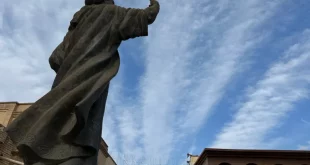On Tuesday American troops withdrew from Iraq’s cities to their barracks in accordance with an agreement the George W. Bush administration and the Iraqi government signed hours before a UN mandate permitting US presence in Iraq expired. The June 30 withdrawal was a milestone indeed, some analysts may say, given the fears many people entertained when the United States invaded Iraq in March 2003 without UN approval. But the milestone appears to be one made of desert sand — a milestone that is likely to be reduced to sand in the winds of Iraq’s desert.
Like the lies and deception that led to the invasion of Iraq, Tuesday’s troop withdrawal from Iraqi cities is also a façade, behind which lies a secret agenda to take control of Iraq’s oil resources and dominate the whole of West Asia.
It all began long before the terror attacks on September 11, 2001 — even before Bush assumed the presidency of the United States in January 2000.
Project Iraq was part of a secret blueprint prepared by a neocon think tank — the Project for the New American Century (PNAC) — to dominate the globe both militarily and economically. This blueprint for a global Pax Americana was authored by Dick Cheney who was Bush’s vice president from 2000 to 2008, Donald Rumsfeld, who was Bush’s Defence Secretary, Paul Wolfowitz, Deputy Defence Secretary and other neoconservatives (neocons) such as Richard Pearl, Lewish Libby and Jeb Bush, the younger brother of President Bush.
 The blueprint, titled ‘Rebuilding America’s Defences: Strategies, Forces and Resources’, was ready by September 2000 and had included a security plan that the neocons had previously worked out for Israel. In the late 1990s, a draft of this highly ambitious plan was sent to US President Bill Clinton, but he did not buy it. But the neocons found more than a willing partner in George W. Bush, who, with his Born-Again evangelical zeal, jumped on the bandwagon.
The blueprint, titled ‘Rebuilding America’s Defences: Strategies, Forces and Resources’, was ready by September 2000 and had included a security plan that the neocons had previously worked out for Israel. In the late 1990s, a draft of this highly ambitious plan was sent to US President Bill Clinton, but he did not buy it. But the neocons found more than a willing partner in George W. Bush, who, with his Born-Again evangelical zeal, jumped on the bandwagon.
The blueprint says: “The United States has for decades sought to play a more permanent role in Gulf regional security. While the unresolved conflict with Iraq provides the immediate justification, the need for a substantial American force presence in the Gulf transcends the issue of the regime of Saddam Hussein.”
The blueprint recommended the setting up of permanent bases in Iraq, Saudi Arabia and Kuwait despite domestic opposition in these countries to stationing US troops because “Iran may well prove as large a threat to US interests as Iraq has”.
The blueprint also saw China as a threat and called for an increase US military presence in Southeast Asia.
Given the recommendations of the blueprint and the presence of its authors in the top positions of the Bush administration, it was no mere coincidence that the plan began to roll on as soon the Republicans took control of the White House in 2000. This, however, astonished some top counter-terrorism officials who were not part of Bush’s inner circle which planned the Iraq invasion.
Richard Clarke, the White House counter-terrorism chief, was one such official. He resigned in disgust when Bush and his neocon officials failed to heed his warnings on an imminent attack on US targets. Clarke in his book, “Against All Enemies,” claims that each time he warned of an imminent al-Qaeda attack on US targets, Bush and his intelligence officials pressurized him to prepare a report linking Iraq to al-Qaeda. When he pointed out that there was no link between Iraq and al-Qaeda and that Iraq posed no threat to the security of the United States, he was told to come back with a new report establishing a link.
“The (Iraq) crisis was manufactured, and Bush political adviser Karl Rove was telling Republicans to ‘run on the war,” Clarke says in his book, noting that when the 9/11 attacks occurred, Defence Secretary Rumsfeld proposed bombing Iraq instead of Afghanistan. Award-winning Washington Post journalist Bob Woodward in his book “Plan of Attack” corroborates the claim that the plan for a war on Iraq preceded the plan to launch the war on terror.
The Bush and his neocon hawks used Iraq’s alleged links with al-Qaeda and its non-existent weapons of mass destruction as a pretext to start the war in 2003. British Prime Minister Tony Blair also joined the war party and produced a false dossier to claim that Iraq’s WMDs posed a threat to Europe and they could be assembled within 45 minutes.
History has seen many a war, but the 2003 Iraq war was perhaps the first to be launched based on blatant lies and threadbare deception. When they could not find any WMDs or prove Saddam’s links with al-Qaeda, some Bush administration officials admitted to intelligence failure. Whatever it was, it was the Iraqi people who suffered the most. Some 1.3 million of them have died. The US war casualty figure was 4,321 as of yesterday. The money spent on the war is a whopping US$ 683 billion. This sum could have eradicated global poverty many times over. Besides, the war has also produced five million Iraqi refugees.
Yet, Bush and his hawks were spared of impeachment. Perhaps, in the post-9/11 political order, presidents are given a licence to mislead the American people. It was only a few months before Bush was elected to office that President Bill Clinton survived an impeachment process for telling a lie that he did not have sexual relations with White House intern Monica Lewinsky. Clinton’s lie did not kill a single fly. Such was the post-9/11 political change — nay decadence.
If the Bush administration was crude in its deceptive moves, the Barack Obama administration appears to be refined. President Obama projected himself as an opponent of the Iraq war and claimed that the real war on terror was not in Iraq but in the Af-Pak region — a word his officials coined to refer Afghanistan and Pakistan.
Obama is sending more troops to Afghanistan and intensifying the campaign there, not because the United States has little or no interest in Iraq, but because the administration feels that US interests are being very well served in Iraq and therefore, there is no necessity to increase the troop level. For instance, as the US troops were being pulled back to barracks from Iraq’s cities on Tuesday in terms of the Status of Forces Agreement (SOFA), a meeting was being held in Baghdad to sell off Iraq’s oil reserves to ExxonMobil, Chevron and British Petroleum. Some western oil companies have started oil production operations in northern Iraq after cajoling the pro-American Kurdish administration there.
The US is getting Iraqi oil on a platter and maintaining its biggest overseas military base — bigger than even the Vatican — in Baghdad. So what else does it want? The neocons’ imperialist objective of dominating the region militarily and taking control of Iraq’s oil reserves has been well and truly achieved. Mission accomplished.
Tuesday’s troop withdrawal from Iraq’s cities in terms of SOFA appears to be another charade. Other major SOFA deadlines are: the withdrawal of US troops from all parts of Iraq and confining them to barracks before August 2010 and the departure of all US troops — except an undetermined number to train Iraqi forces — by December 2011.
Now that the US troops have withdrawn from the cities, does it mean that they cannot return to the cities? No, they can. They can be deployed at any time, if the Iraqi government wants them or the Americans feel the situation warrants such deployment. Already, both the Iraqi government and its American masters have found ways to circumvent the SOFA provision which precludes US military presence in Iraqi cities after the June 30, 2009 deadline.
On May 19, a Christian Science Monitor report said that Iraqi and American officials redrew the borders of Baghdad’s city limits, so that the US troops could still patrol Baghdad’s southern parts, which have now become out-of-city areas. Bush or no Bush, the same old dirty tricks, it appears, continue to spring out of Pentagon pockets
What is more disturbing are reports that the United States has plans to remain in Iraq even after the December 2011 deadline. All that the United States requires is an invitation from the Iraqi government. The United States sees no difficulty in exacting such an invitation from the Nouri al-Maliki government whose submissiveness to Washington’s dictates is no secret.
 Sri lanka Muslims Web Portal Diversity and Inclusiveness
Sri lanka Muslims Web Portal Diversity and Inclusiveness



